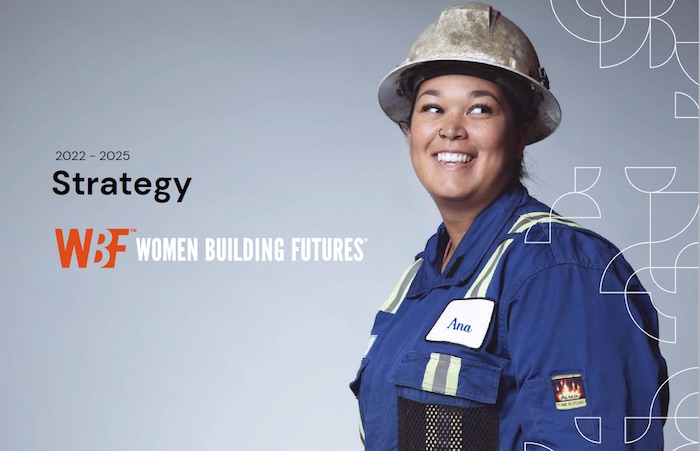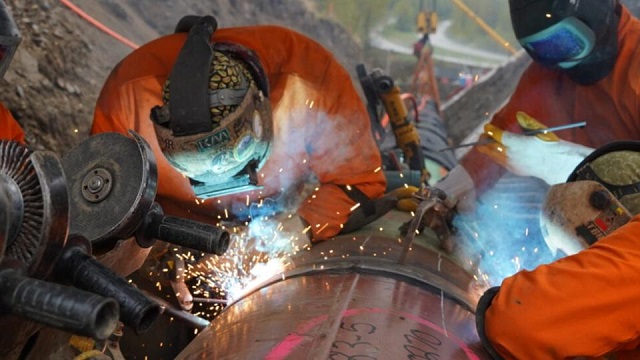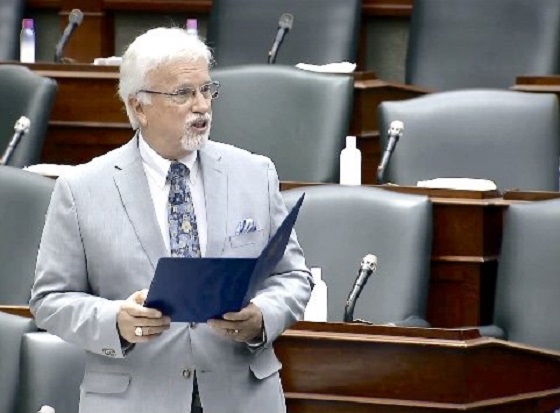Alberta
Province announces $10.7 million boost for women building careers in the skilled trades

Supporting women in the skilled trades
Alberta is providing $10.7 million to Women Building Futures to support women looking to build a career in the skilled trades.
Through Budget 2023, Alberta’s government is investing in women and empowering them to build rewarding careers. Over the next three years, $10.7 million will support Women Building Futures in their work while ensuring employers have the talent they need to grow their businesses.
Women Building Futures is a non-profit organization that helps unemployed and underemployed women explore a future in the skilled trades, where they can gain paid, on-the-job experience and build a career. Through employment training, support services, readiness workshops, affordable housing and more, the organization connects women to employers while they develop job-ready skills.
“On International Women’s Day we celebrate the incredible potential of women’s economic empowerment. By supporting Women Building Futures, Alberta is helping women gain job-ready skills to build rewarding careers in the skilled trades while ensuring Alberta’s prosperity.”
“More women are joining the skilled trades each year and I’m so excited to see that. Women Building Futures does such important work to prepare and support women looking at skilled trade careers and I’m thrilled that our government is supporting their work. This is great news for women, for families, for businesses, and for Alberta as a whole.”
Increasing opportunities for skilled labour
As Alberta’s economy remains strong and continues to grow, it’s important the province’s skilled labour supply grows with it. Partnering with Women Building Futures to increase the number of women in the skilled trades offers new opportunities for well-paying, high-demand work while providing industry with access to crucial talent.
About 5,700 women apprentices were registered in Alberta last year, a 20 per cent increase from 2021. While the number of women continues to increase, there is more work to be done to alleviate the gender gap in the skilled trades.
“Stable operational funding for Women Building Futures during the next three years gives us the flexibility to keep our focus on helping unemployed and underemployed women remove barriers to successful careers in the trades. This is good for women and good for Alberta.”
“Women Building Futures provided me a stable foundation to start my journey as a heavy equipment technician. The program I had the chance to attend provided me with knowledge, confidence and tools to be successful. They have also kept in touch with me every step of the way and have had my success as their priority.”
“Being selected as an Employer of Choice is a great acknowledgement of the success of our partnership with Women Building Futures. This work has been so meaningful to all involved, not only because it’s had such a positive impact on our projects, but because we have seen first-hand the individual transformations of candidates and the ripple effect that has on economic security and well-being of these women and their communities.”
“We are proud that our Graham projects employ women in trades at a rate over twice the national average, and that women have the same opportunities as anyone to build a career in the construction industry. As a WBF Employer of Choice, our partnership with Women Building Futures has helped us to attract and retain a pipeline of excellent talent, improve collaboration and communication on our projects, and deliver better outcomes for our clients. We believe that embracing diversity and maintaining a culture that values and respects all individuals is not only the right thing to do but also the key to continued success as we continue to develop a workforce that is representative of the communities we build and serve.”
Budget 2023 secures Alberta’s future by transforming the health-care system to meet people’s needs, supporting Albertans with the high cost of living, keeping our communities safe and driving the economy with more jobs, quality education and continued diversification.
Quick facts
- Women Building Futures is a non-profit organization with 18 employment programs in six Alberta communities.
- Since 1998, more than 2,700 women have graduated from Women Building Futures training programs.
Alberta
Game changer: Trans Mountain pipeline expansion complete and starting to flow Canada’s oil to the world

Workers complete the “golden weld” of the Trans Mountain pipeline expansion on April 11, 2024 in the Fraser Valley between Hope and Chilliwack, B.C. The project saw mechanical completion on April 30, 2024. Photo courtesy Trans Mountain Corporation
From the Canadian Energy Centre
By Will Gibson
‘We’re going to be moving into a market where buyers are going to be competing to buy Canadian oil’
It is a game changer for Canada that will have ripple effects around the world.
The Trans Mountain pipeline expansion is now complete. And for the first time, global customers can access large volumes of Canadian oil, with the benefits flowing to Canada’s economy and Indigenous communities.
“We’re going to be moving into a market where buyers are going to be competing to buy Canadian oil,” BMO Capital Markets director Randy Ollenberger said recently, adding this is expected to result in a better price for Canadian oil relative to other global benchmarks.
The long-awaited expansion nearly triples capacity on the Trans Mountain system from Edmonton to the West Coast to approximately 890,000 barrels per day. Customers for the first shipments include refiners in China, California and India, according to media reports.
Shippers include all six members of the Pathways Alliance, a group of companies representing 95 per cent of oil sands production that together plan to reduce emissions from operations by 22 megatonnes by 2030 on the way to net zero by 2050.
The first tanker shipment from Trans Mountain’s expanded Westridge Marine Terminal is expected later in May.
 Photo courtesy Trans Mountain Corporation
Photo courtesy Trans Mountain Corporation
The new capacity on the Trans Mountain system comes as demand for Canadian oil from markets outside the United States is on the rise.
According to the Canada Energy Regulator, exports to destinations beyond the U.S. have averaged a record 267,000 barrels per day so far this year, up from about 130,000 barrels per day in 2020 and 33,000 barrels per day in 2017.
“Oil demand globally continues to go up,” said Phil Skolnick, New York-based oil market analyst with Eight Capital.
“Both India and China are looking to add millions of barrels a day of refining capacity through 2030.”
In India, refining demand will increase mainly for so-called medium and heavy oil like what is produced in Canada, he said.
“That’s where TMX is the opportunity for Canada, because that’s the route to get to India.”
Led by India and China, oil demand in the Asia-Pacific region is projected to increase from 36 million barrels per day in 2022 to 52 million barrels per day in 2050, according to the U.S. Energy Information Administration.
More oil coming from Canada will shake up markets for similar world oil streams including from Russia, Ecuador, and Iraq, according to analysts with Rystad Energy and Argus Media.
Expanded exports are expected to improve pricing for Canadian heavy oil, which “have been depressed for many years” in part due to pipeline shortages, according to TD Economics.
 Photo courtesy Trans Mountain Corporation
Photo courtesy Trans Mountain Corporation
In recent years, the price for oil benchmark Western Canadian Select (WCS) has hovered between $18-$20 lower than West Texas Intermediate (WTI) “to reflect these hurdles,” analyst Marc Ercolao wrote in March.
“That spread should narrow as a result of the Trans Mountain completion,” he wrote.
“Looking forward, WCS prices could conservatively close the spread by $3–4/barrel later this year, which will incentivize production and support industry profitability.”
Canada’s Parliamentary Budget Office has said that an increase of US$5 per barrel for Canadian heavy oil would add $6 billion to Canada’s economy over the course of one year.
The Trans Mountain Expansion will leave a lasting economic legacy, according to an impact assessment conducted by Ernst & Young in March 2023.
In addition to $4.9 billion in contracts with Indigenous businesses during construction, the project leaves behind more than $650 million in benefit agreements and $1.2 billion in skills training with Indigenous communities.
Ernst & Young found that between 2024 and 2043, the expanded Trans Mountain system will pay $3.7 billion in wages, generate $9.2 billion in GDP, and pay $2.8 billion in government taxes.
Alberta
Canada’s postal service refuses to help with Trudeau’s gun ban buyback program: report

From LifeSiteNews
According to a report, Canada’s mail service notified the Trudeau government via a letter that it would not participate in the buyback scheme, citing safety concerns for its employees.
Canadian Prime Minister Justin Trudeau’s federal government crackdown on legal gun owners through a buyback scheme has hit a major roadblock after Canada Post, a federal-run institution, signaled it will refuse to participate in scooping up thousands of legally purchased firearms at the bequest of the government.
According to government sources in a recent Radio-Canada report, the Trudeau Liberals were hoping Canada Post would help collect approximately 144,000 “assault” and “military-style” firearms that were recently banned by the government. Canada Post currently delivers guns via mail that are legally purchased to those with firearms licenses.
The inside source, who chose not to be named, noted that Canada Post notified the Trudeau government via a letter that it would not participate in the buyback scheme, citing safety concerns for its employees.
According to the source, Canada Post is still talking with the federal government, with one idea being to allow it to transport guns but not oversee getting them from their legal owners.
“It’s a challenge, but we do not think this jeopardizes our timetable or the government’s desire to move forward,” said one source, adding, “We want the discussions to continue.”
As for the Trudeau federal government, it continues to say that having Canada Post be involved in the gun buyback is the “most efficient” as well as “least costly” way to get the guns back from owners.
Trudeau’s gun grab was first announced after a deadly mass shooting in Nova Scotia in May 2020 in which he banned over 1,500 “military-style assault firearms” with a plan to begin buying them back from owners.
Late last year, the Trudeau government extended the amnesty deadline for legal gun owners until October 30, 2025. It should be noted that this is around the same time a federal election will take place.
The Canadian government’s controversial gun grab Bill C-21, which bans many types of guns, including handguns, and mandates a buyback program became law on December 14, 2023, after senators voted 60-24 in favor of the bill.
In May 2023, Bill C-21 passed in the House of Commons. After initially denying the bill would impact hunters, Trudeau eventually admitted that C-21 would indeed ban certain types of hunting rifles.
Alberta and other provinces promise to fight Trudeau’s gun grab tooth and nail
On the same day news broke that Canada Post said it would not participate in Trudeau’s gun buyback, Alberta chief firearms officer Teri Bryant last Wednesday issued a statement saying, “We urge the federal government to abandon this ill-advised program and meaningfully consult the provinces as we work to address the actual causes of firearms crime.”
“Canadians are still waiting for concrete details about the federal firearms confiscation program that has been in the works since 2020, and Canada Post’s refusal to participate in the federal government’s firearms ‘buy-back’ program is just one more example of how little forethought or engagement has gone into implementation of this program,” Bryant said.
Bryant noted that the buyback will not “significantly improve public safety” because it does not target those “involved in criminal activity and gun violence, and Albertans can be assured that our government will continue to advocate for our law-abiding firearms community.”
“We believe in a principled and informed approach to firearms policy that preserves public safety and recognizes the immense responsibility that comes with firearms ownership,” she noted.
Bryant observed that the federal confiscation program is not only causing uncertainty for many firearms businesses, but it is also “pulling attention and resources away from programs and initiatives that would help address public safety.”
“It is also undermining public confidence in the fairness of our entire firearms regulatory scheme,” she added.
Indeed, LifeSiteNews reported in February that despite Trudeau’s crackdown on legal gun owners, Statistics Canada data shows that most violent gun crimes in the country last year were not committed at the hands of legal gun owners but by those who obtained the weapons illegally.
Alberta Premier Danielle Smith, along with premiers from no less than four additional provinces, are opposed to C- 21.
Late last year, Smith promised she would strengthen the gun rights of Albertans because of Trudeau’s gun grab.
-

 Education2 days ago
Education2 days agoSupport a young reader through the Tim Hortons Smile Cookie campaign
-

 Alberta2 days ago
Alberta2 days agoAlberta threatens to fight Trudeau government restrictions on Canada’s plastics industry
-

 John Stossel24 hours ago
John Stossel24 hours agoWhy Biden’s Just Wrong: NO ONE “Knows How to Make Government Work.”
-

 Automotive2 days ago
Automotive2 days agoCanadian interest in electric vehicles falls for second year in a row: survey
-

 Business1 day ago
Business1 day agoWEF panelist suggests COVID response accustomed people to the idea of CBDCs
-

 COVID-191 day ago
COVID-191 day agoFormer Canadian lawmaker has no regrets about refusing COVID shot despite losing his job
-

 COVID-191 day ago
COVID-191 day agoPeckford: Hallelujah! Supreme Court of Canada to hear Newfoundland and Labrador charter case
-

 illegal immigration23 hours ago
illegal immigration23 hours agoFlight Docs Reveal Which Cities Are Receiving Migrants Under Biden’s Parole Program




